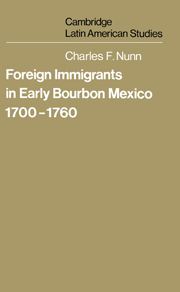Book contents
- Frontmatter
- Contents
- List of tables and figures
- Acknowledgements
- Viceroys of New Spain, 1688–1766
- Map of the viceroyalty of New Spain in 1740
- Introduction
- 1 Spies, interlopers, and the famous foreign merchant
- 2 Entering the viceroyalty: immigrants by accident and by design
- 3 Religion: the essential requirement
- 4 Other hurdles to acceptance
- 5 The burden of wealth
- Conclusion
- Appendices
- List of abbreviations and conventions
- Notes
- Bibliography
- Index
- Frontmatter
- Contents
- List of tables and figures
- Acknowledgements
- Viceroys of New Spain, 1688–1766
- Map of the viceroyalty of New Spain in 1740
- Introduction
- 1 Spies, interlopers, and the famous foreign merchant
- 2 Entering the viceroyalty: immigrants by accident and by design
- 3 Religion: the essential requirement
- 4 Other hurdles to acceptance
- 5 The burden of wealth
- Conclusion
- Appendices
- List of abbreviations and conventions
- Notes
- Bibliography
- Index
Summary
A handful of scholars have written about foreigners in other periods or in other parts of the Spanish American empire. A few authorities in dealing with their own topics have also touched on foreigners. Synthesizing these various views and applying them to colonial Mexico in the first half of the eighteenth century would suggest several things. The most important of these inferences are that Spanish law was reasonably effective in excluding foreigners, that there were a few exceptions such as prisoners of war, illicit traders, and Jesuits, but that even then their numbers were small. Since the kings of Spain and their advisers saw aliens as potential threats to imperial, religious, and mercantile security and since the crown legislated accordingly, it might also be assumed that the Spaniards were both xenophobic and intolerant. Reinforcing this view still further, surviving sixteenth-century Protestant and eighteenth-century Enlightenment prejudices about the Inquisition might exaggerate both the zeal of the Holy Office and the bigotry of Spaniards toward outsiders.
The laws were strict, but the documents, primarily from the Archive of the Indies (AGI) in Seville and the National Archive of Mexico (AGN) in Mexico City, suggest that the preceding assumptions misconstrue the situation in New Spain between 1700 and 1760. Prisoners of war often stayed to settle after their release, most foreign merchants had nothing to do with smuggling, and Jesuits were not the only foreign churchmen.
- Type
- Chapter
- Information
- Publisher: Cambridge University PressPrint publication year: 1979



